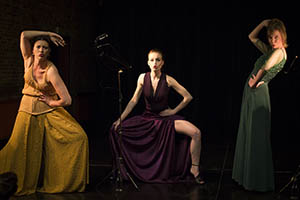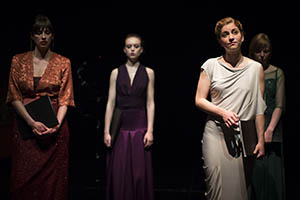Lorna Irvine speaks with the director of the internationally-acclaimed theatre company.
Ontroerend Goed (which translates as 'Feel Estate') are a Ghent-based theatre company who originally started out as performance poets. Their raw, confrontational work, which reflects societal attitudes and taboos, often divides audiences and critics alike, but they also have many admirers who respect their iconoclastic ambition. Once And For All We're Going To Tell You Who We Are, So Shut Up And Listen put budding teenage sexuality in the spotlight, and Audience featured a female audience member (really a plant) getting sexually harassed by a male cast member in order to gauge the moral temperature of audience responses. This year, their new show Sirens focused on entrenched misogyny—from the pressure to be attractive and 'slut shaming' to groping by family members, violence and FGM. It was a huge success at the Edinburgh Festival.
Lorna Irvine caught up via video link with director Alexander Devriendt, who comes across as a warm, eloquent and likeable man, to talk confrontation, shock and immersive theatre.
Lorna Irvine: Sirens was a massive critical hit at the Edinburgh Festival this year. Were you surprised by the positive response it got?

Alexander Devriendt: No, not really, I do have to say, but with Edinburgh I do have to be cautious. And it made me really happy that with this one, there were a lot of opinions about it. I'm always afraid with Edinburgh, but that's to do with the history of it.
I remember with Audience, the show about audience manipulation, there was this massive controversy—a lot of people were angry, and it was a show about my fears about that, and at one point an actor pointed out an audience member, an actress, a plant he knew beforehand (and picked on her). I remember a lot of magazines and press called Ontroerend 'the misogynists' just looking for controversy, then with Teenage Riot there was this question about 'do these kids really want to say this?' which was weird for me because I had just guided them.
That informed this one—I listened to these women through a male ear. That's how we created Sirens. I hoped it wouldn't be a difficulty. I'm really grateful, as this is what we wanted to tell, and what the women wanted to tell, and there was a big joy and feeling that it resonated every single night. That is what you try to do: make something that resonates.
LI: Do you think that European theatre is more ambitious and experimental than British theatre?
AD: European theatre is a big group. Look, I can only speak for my country, and I do have to say there are always these questions. I find it pretty exciting and pretty experimental. There are a lot of reasons, I'm guessing.
For such a small country, there's a lot of theatre and dance happening. There are a few factors.
Our most famous author is Hugo Claus; we learned about him at school. I think he only died about five years ago. He was sent to jail because of his experimental theatre, and he had naked people on stage once (in his dramatic sketch, Masscheroen, considered blasphemous). That's the guy you learned about at school: he's no Shakespeare, he's no Moliere (he smiles wryly).
The first time we were in Britain with The Smile Off Your Face, almost one quarter of plays were to do with Shakespeare. Now, it's almost negligible, but it's still there. It should be, I think... but it has changed a little bit. Another factor is the subsidy system. The first time we had come to Edinburgh seven years ago was with a one-on-one show, which was economically a disaster. But because of the Arts Council funding us, you can experiment—not out of necessity, but there's a freedom involved. I feel, yes, we are more experimental.

LI: A lot of theatre productions this year have focused on gender politics—why do you think that is? A cultural shift in examining attitudes, perhaps?
AD: It's always fascinating. Sirens was made out of a personal drive to discover my own... sex... And why is there sexism, and all of this anger—why isn't it solved yet? And suddenly, you see there's a zeitgeist. People are talking about it. I don't know why. Making an educated guess, it's due to a generational thing... That these young women are... (He pauses, briefly, to ponder this.) It's up to you to figure it out. It's fascinating, and I treasure it.
LI: A lot of your work, such as Audience, Once and For All... etc have caused outrage and shock. Is this intentional, or is it just that you like to scrutinise societal mores?
AD: Shocking is the easiest thing to do. You shock and you block people off: there's no communication anymore. I hate it when people are shocked. With that direct communication theatre has, it's like no other medium. No other art form has it between performer and audience.
I don't want to make anything that reassures myself. I want to make something that challenges you. As the quote goes, 'If art is not challenging, why bother?' But sometimes, there is a line. What's challenging for one is shocking for another.
LI: What I find interesting is your creating immersive work, blurring boundaries between audience and actors, as with Audience, The Smile Off Your Face and Fight Night. I wondered what you though of other immersive artists, like Red Bastard, who confront and actively involve the audience in their work?
AD: I don't know him. But what I can say is that I like it—if the concept demands it. You have this theatre space, and you use it as a free form way to do whatever you like with it. If I was talking politics, you could have the actor and politician and have this communication with the voter and tell something about that. But because of that (staging) decision, my communication happens much more directly, emotionally and intellectually. You don't have to transpose yourself, so I don't like interactive work that is there for form's sake.
It's not a necessity, but if you need it, it's there. For instance, in Sirens, there's no immersion...well, there is, but for example, when they scream, you can't turn off the volume button. You have to close your ears. I don't like audience participation when the audience has to fulfill artistic content. It's only working when you as an audience member are responsible. If you are prepared to give this artistic content for viewers, and there is no work, no formal exercise...I hate those.
LI: Do you have any theatre companies or artists to recommend to the readers?
AD: Yes, I am crazy about Sophie Calle's Take Care Of Yourself (art exhibition). I saw it at the Venice Biennale, and it has guided me on several levels. The work of Jared Diamond—he's a scientist, but with his last work, World Before Yesterday, he has challenged everything I believe. What people believe is human morale, or human judgment, is blown into pieces, really challenged. He's a phenomenal writer.
I love Death Grips (the now-defunct hip-hop act). I know they've ceased to be. I hope they will do more projects. I love their energy. I've seen them three times.
Theatre? I saw Kim Noble (You're Not Alone) at the Traverse. Incredible. He had said, “It was either make this show, or commit suicide,” and I believe that. But it was pretty intense and sad and so...joyful at the same time. Beautiful.

LI: Finally, what is next for you, in terms of projects?
AD: I made A History Of Everything: quite a gentle show—the nicest one I've made. I made it after Audience, which says something (chuckles).
The next project I am working on has a palindrome for a title, and the show is also a palindrome: you can see the show back and forth. One of these times, you have an idea and you just have to treasure it. So, I'm taking my time to do this. Hopefully, we'll bring it to Edinburgh next year, but the problem is it may have to go to the International Festival because of the space I'll need. Hopefully, that will happen. I'm so looking forward to it. It's a show about humanity- how we can make it or not make it—all this information we get from the Internet, Facebook, social media, etc. about how we are screwing up—as an artist, you can't make that. I tried that in All That Is Wrong: I am glad I found a metaphor for that.
For more information, go to Ontroerend Goed’s English website page: http://www.ontroerendgoed.be/en/home/
Sirens images: ©Ronny Wertelaers